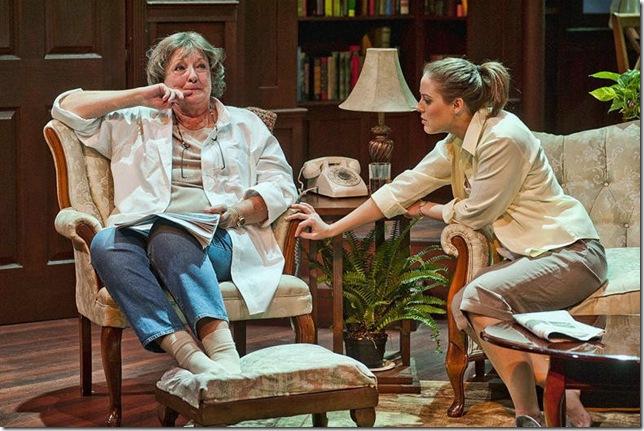Most productions of Donald Margulies’ wily, articulate drama Collected Stories portray the relationship between renowned short story writer Ruth Steiner and her persistent protégé Lisa Morrison as the literary equivalent of All About Eve.
For despite her seeming innocence and adoration of the older writer, the ambitious Lisa ultimately betrays her trust, making public a very personal reminiscence, using it as the basis for her first novel.
But in the hands of director Margaret Ledford, deftly drawing a pair of remarkable performances from Barbara Bradshaw (Ruth) and Kim Morgan Dean (Lisa), the play becomes something more balanced and nuanced, asking us to consider the artistic and personal ethics involved, leaving it up to the audience to decide how they feel about the ownership of the story.
You could call Collected Stories an issue play, if it were not brimming with such fascinating, fully dimensional characters. Ruth Steiner is a meticulous writer who spouts wisdom about the craft with curmudgeonly affection. Undoubtedly at a sacrifice of her own literary output, she has devoted years to mentoring young writers of promise through classes and tutorials at NYU.
As the play begins, an apparently intimidated Lisa enters Ruth’s Greenwich Village apartment for a coaching session with the legendary woman. All nervous flutter, Lisa speaks with the cadences of a Valley Girl, which make her all the more difficult to take seriously.
Yet she manages to worm her way into Ruth’s life, becoming her clerical aide, a job which comes with the perk of intimate attention and editing suggestions on her own writing. Gradually, Lisa begins speaking better and dressing with a new sophistication, as Ruth rubs off on her. Soon, she has a book of her short stories published and critically well received.
One day, Ruth confides in Lisa the details of a life-changing love affair she had years earlier with the tortured, alcoholic poet Delmore Schwartz. When Lisa uses the story, barely fictionalized, in her debut novel, Ruth feels understandably betrayed. But as Lisa explains, she was only being true to her artistic impulses, just as Ruth long taught her.
Dean, returning to South Florida for this production, reminds us why she quickly became one of the most accomplished young actresses in the region in the few short years she lived down here. In addition to the impressive transition she makes from naïve student to cunning professional writer, she retains a bit of the former in a tasty scene in which she reads and relishes her first New York Times review.
Bradshaw is such a wryly comic performer that she rarely gets a juicy dramatic role like Ruth, but she holds her own tutorial in how to mesmerize an audience when she does. Here she gives a very layered characterization, alternately steely and maternal, tough and gentle. The years are erased as she recalls her youth with her idol-lover, and she rises to the demands of the final payoff scene with consummate skill.
If the performance rings a bit false, it is because Ruth is frequently described as being Jewish and Bradshaw never convinces us of that ethnic background, no matter how many Yiddish phrases she drops into her conversation. A minor quibble.
Douglas Grinn contributes a wonderfully textured writer’s apartment, full of antiquated equipment — a dial phone, an electric typewriter — that silently tell us about Ruth. There are plenty of reasons to see this Mosaic production, and the play itself is high on the list. But at the top are surely the two memorable performances that breathe such vitality into Margulies’ words.
COLLECTED STORIES, Mosaic Theatre, American Heritage School, 12200 West Broward Blvd., through Sunday, Dec. 5. Tickets: $37. Call: (954) 577-8243.
